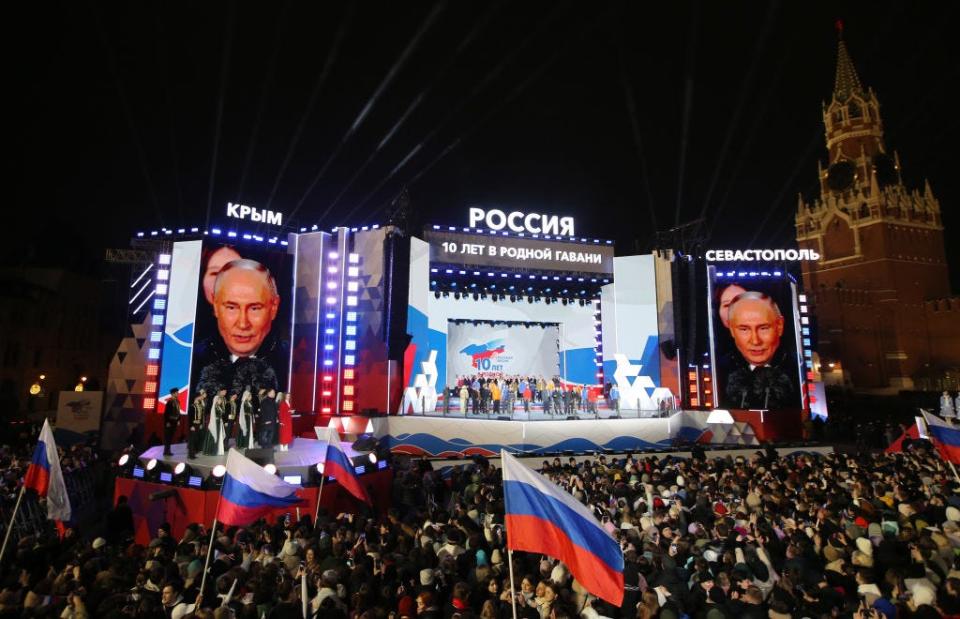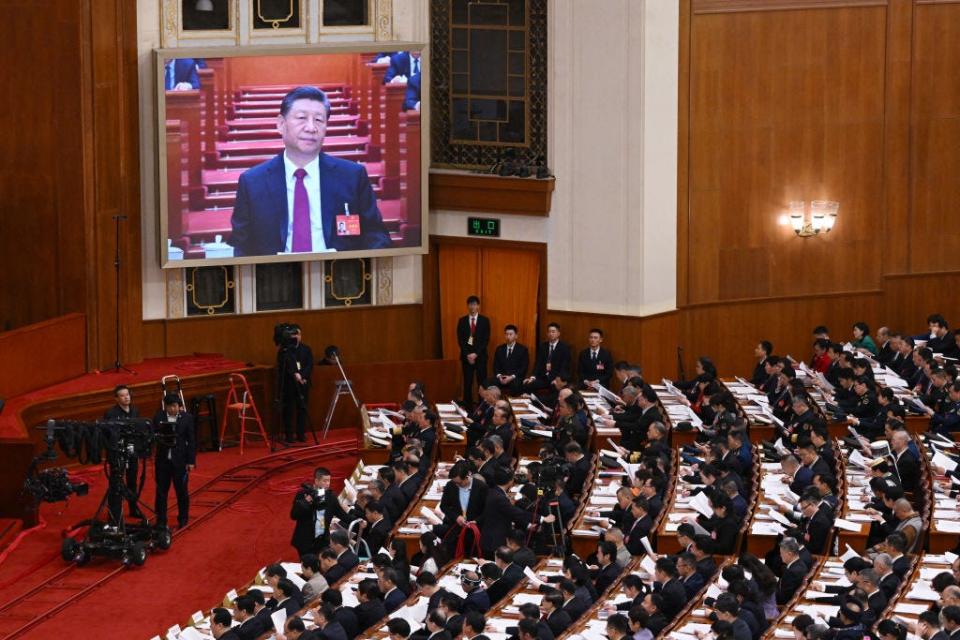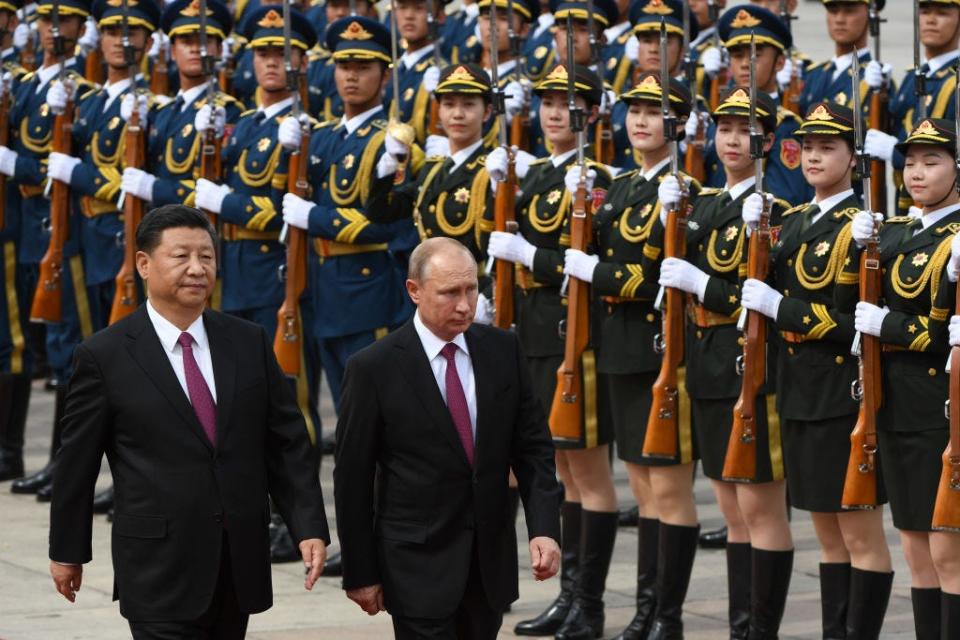How Putin and Xi both bent their nations to their will to become presidents for life

- Oops!Something went wrong.Please try again later.
- Oops!Something went wrong.Please try again later.
Vladimir Putin and Xi Jinping are drawing closer together in the wake of the Ukraine war.
They share old grudges about Western power and imperialistic ambitions.
They have followed strangely parallel paths, overcoming term limits to seize indefinite power.
When Vladimir Putin delivered his victory speech this week in Russia's election (widely condemned as meaningless), there was one man he singled out for praise: China's authoritarian leader, Xi Jinping.
Putin lavished praise on Russia's ties with China, saying they would grow even stronger in his fifth presidential term, underpinned by his "good personal relations" with Xi.
Reuters reported that Putin's first trip abroad in his new term in office would be to visit his ally.
It's a friendship forged between leaders whose careers have followed remarkable parallels.
Both took power in countries meant to have safeguards against absolute power, with two-term limits for their leaders.
In the past decade, Putin and Xi have crushed what little remained of domestic opposition on their paths to absolute power.
As part of that process, both men reshaped the political system to keep themselves in power — both men are effectively presidents for life.
Graeme Thompson, an analyst with the Eurasia Group, told Business Insider that the leaders were now bonding over a shared global ambition to curtail US power.
"Both are seeking to restore their respective countries to what they see as their rightful places among the world's great powers," he said, seeking to unseat the US as the global power center.
"And both deploy the politics of nationalism and resentment toward the West, pointing to past periods of weakness and instability — China's so-called century of humiliation in the 19th century and Russia's post-Soviet collapse in the 1990s — to justify their domestic repression and foreign-policy goals."
The paths to totalitarianism
When Putin began his political career, he cast himself as a reformer, committed to the liberalization of Russia after the collapse of the Soviet Union. He even hung out with Hollywood celebrities to cement his image.
But two decades on, the situation could not be more different, and the Russian leader is no longer attempting to disguise his authoritarianism.
Putin has destroyed what remained of Russia's opposition, and relations with the West have sunk to their lowest point in decades.
In many ways, Putin's unchallenged domestic power increasingly resembles that wielded by Xi to his east.
They were born a year apart: Putin in 1952 and Xi in 1953. They rose from bureaucratic obscurity to rule and later dominate their countries.

Robert Dover, a professor of international security at the University of Hull in the UK, said that Xi and Putin shared a skill at building loyal networks of power.
"Both Putin and Xi's careers were forged as highly effective backroom operators forging relationships of dependency and patronage," he said.
He pointed to Putin's early career as a KGB operative and local politician and Xi's as a Communist Party official, negotiating the perilous world of each nation's politics.
Xi has gone even further than Putin in his pursuit of total power.
He ended hopes in the early years of the 21st century that China could be headed toward openness and liberalization.
He has worked to destroy domestic opposition, imprisoning the Uyghur Muslim minority in prison camps and cracking down hard on displays of independence in Hong Kong.
He ushered in a law declaring him president for life in 2018.
More recently, he dispensed with one of the few remaining opportunities for the Chinese government to be subjected to even minimal scrutiny when he ended Chinese Premier Li Qiang's annual press conference in 2024.
During his decade into power, he has imposed a dystopian surveillance system in China, where citizens' lives are comprehensively monitored for signs of dissent.
In Russia, Putin served two terms as president and then switched to prime minister for four years, enabling him to get around a ban on serving more than two terms in a row.
In 2021, he went further. Putin signed a law that notionally tightened the limits on Russian presidential terms to a maximum of two in a lifetime.
But it had a loophole: The law also reset the count, meaning he could run twice more, enough to keep him in office until 2036, when he would be 83.
Both leaders have placed combatting foreign threats at the heart of their ideologies, whether in the form of "decadent" cultural influences (such as Xi's hatred of Korea's K-pop bands), or plots by the US and its allies to "encircle" their countries.

Dover said it would be a mistake to see Putin and Xi simply as dictators operating by arbitrary fiat.
Both, he said, had built effective networks of loyalists capable of responding to crises and enacting their ambitious strategies to seize more global power.
They have the "long-term planning scope to push out very ambitious military and technology futures to the middle of the century," he said.
Xi and Putin bond over hatred of Western power
It's on the global stage that the synergy between the leaders is of growing significance and growing alarm to Western leaders.
Xi and Putin share an imperialistic vision of their nations' destinies and a determination to end Western dominance.
Both leaders, said Dover, have developed a keen understanding of just how far they might go in undermining the West, without provoking war.

"Russia and China have sought to influence Western societies and politics through aggressive influence operations, in impacting upon elite opinion former groups and through sophisticated manipulation of broadcast and social-media platforms," he said.
"Both Putin and Xi have acquired an astute understanding of the sorts of highly aggressive actions that will not provoke a unified Western response: This is particularly hazardous for the West."
Their global strategy is playing out not just in covertly undermining the West through propaganda and espionage but in the invasion of Ukraine.
China has provided Russia with crucial diplomatic and economic support. Xi most likely believes that a Ukrainian defeat would be a massive blow to US prestige and a boost for China.
Xi is studying the war closely, experts say, because if US resolve to defend its allies is weakened by a Ukrainian defeat, then his own ambition of seizing control of Taiwan would be made much easier.
But there are problems
But there do appear to be clear limits to Putin and Xi's supposedly "no limits" partnership that could imperil the relationship in coming years.
"It's almost a truism that authoritarian states cannot trust each other, and at minimum both Putin and Xi will ultimately do what is best for themselves and their regimes," Thompson said.
Putin appears wary of Xi's newfound economic power over Russia. Xi has sought to leverage that power by seeking influence in the Central Asian republics that have long been considered part of Russia's sphere of influence.
One possible flash point, said Thompson, is Russia's far-eastern provinces, which Chinese nationalists have long regarded as China's rightful territory.
He even envisaged a distant future in which Russia could again seek closer ties with the West to balance against China's growing might and ambition.
"Perhaps a post-Putin Russia, fearing growing Chinese power in East Asia, will even eventually pivot back toward the West to balance against Beijing," he said, "although that is a long way off."
Read the original article on Business Insider

